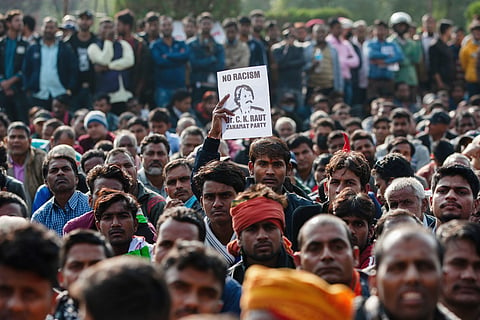The saga of C K Raut and the Madhesh’s struggle for justice in Nepal
THE TRAILER FOR Dr CK Raut: The Passion opens with a fictionalised Raut in a navy-blue suit and red tie, standing above a crowd as it chants, “What do we want? Freedom!” Raut lifts his fist into the air and says, in Hindi, “Now we will not ask for Madhesh, we will snatch it away.” In a later scene, he is beaten by policemen and left bleeding. The blood drips onto a map of Nepal, cutting a line through the country’s southern belt. “Jai Madhesh!”, Raut shouts. At the close, unfazed after even more assaults, he breaks apart his handcuffs and growls, “Now Madhesh will not be a slave to anyone. The chains of slavery will have to be broken.”
The trailer is an accurate depiction of the mythology that surrounds Raut in much of the Madhesh region, in Nepal’s southern plains. Raut is thought to be a fearless advocate of the rights of Madheshi people, superhero-like in his grit and tenacity. His ability to articulate the pain of state oppression and neglect, manifest in the Madesh’s political disenfranchisement and economic despair, won him legions of supporters, and in 2006 Raut founded the Alliance for Independent Madhesh (AIM). The group described itself as an “alliance of Madheshi people, activists, parties and various organizations working for establishing an independent and sovereign Madhesh,” and demanded the withdrawal of the Nepali state’s “colonial” administration and security forces from the region. AIM’s message was simple: progress and justice could only come to the Madhesh if the power and the people of the Pahad, the historical centre of Nepal’s politics and government, were excised from it.

